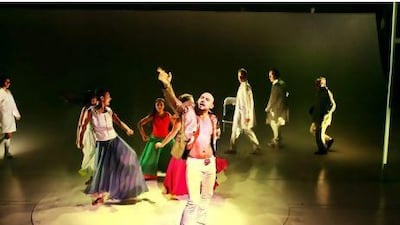It's been quite a year for Bollywood outside its traditional Indian heartland. The ambitious Hindi sci-fi superhero epic Ra. One was considered to have raised the bar considerably for the genre, and in the UK it opened above the likes of George Clooney's The Ides of March and the Oscar-tipped weepie The Help. A few months before, Siddique's Bodyguard enjoyed the most successful opening week of any Bollywood film ever, breaking records in Dubai, the UK and North America.
Impressive stuff. But an event in London this week is surely the final proof that Bollywood has crossed over for good. And there's not a cinema screen in sight. The prestigious Southbank Centre holds a winter festival every year, with highlights in the past including festive favourites such as Peter and the Wolf, Hansel and Gretel and Messiah By Candlelight. But this year's most intriguing event is The Bollywood Trip, a tragicomic musical drama fusing eastern and western traditions.
It's testament to the increasingly multinational characteristics of Bollywood that this show has been devised by a Danish theatre company and choreographed by the kathak exponent Gauri Sharma Tripathi. Meanwhile, the score was composed by Stephan Grabowski in Mumbai and Copenhagen with Waqas Ali Qadri and several of AR Rahman's cohorts, and will be played live by Indian musicians. But it's the lead actor Janus Nabil Bakrawi who epitomises this project. He is part-Polish, part-Palestinian, part-Danish - and fully in love with Bollywood.
"I think I've got Bollywood in my blood," he says with a laugh. "I've just got the same energy. If I'd been born in India I think I would have been a BolIywood star for sure."
Bakrawi is joking, but it's clear that the form has influenced his work (the script was written by Parminder Singh, but the concept is Bakrawi's) in myriad ways. The Bollywood Trip is in some senses a western story: there are nods to Ken Kesey's famous novel One Flew Over the Cuckoo's Nest in that Bakrawi's character, Haroon, ends up in a psychiatric ward convinced he is famous. He sets about turning the ward upside down, despite his doctors thinking he is delusional.
So what prompted Bakrawi to make the lead character a supposed Bollywood star?
"Because I've been fascinated by Bollywood movies since I was a child," he says. "I wanted to use Bollywood to tell this story because I love the way it expresses emotions and feelings. It's very direct, it doesn't have hidden agendas. What you see is what you get. I quite like that, compared to the western way of telling stories, where everything is secret and you have to try to work out what is happening."
And, of course, the sheer exuberance that characterises the cinematic form makes it ripe for interpreting on the stage.
"And although the stories are larger than life, there's usually a lot of struggle in Bollywood, where the hero is trying to break free from traditions in order to succeed," he says. "The movies nearly always say that you should go for your dreams, your fantasies, the one you love. And isn't that fantastic?"
But, he admits, transposing Bollywood from screen to stage is far from straightforward. This is where the director Rolf Heim and the choreographer Tripathi came in, shaping The Bollywood Trip into a physical performance piece combining live music, theatre, acting and dancing.
"We had a blank canvas to tell the story of this guy who comes from India to Denmark, believing he's a Bollywood star," she explains. "And it was really interesting to juxtapose a very simple European theatrical sensibility with the variety, colour and emotion of Bollywood. I'm known for kathak dance, so I've put a lot of that into this production - because it's a really good medium to tell a story. I really pushed for the dance elements to drive the narrative along rather than interrupt it."
This, Bakrawi thinks, is where The Bollywood Trip's many different disciplines coalesce into something completely new. In Bollywood and the western musical there is often a scene with dialogue, and then the story will stop for the music or the dancing before the narrative continues again. Here, the acting, singing and dancing all interact with one another.
"They're all part of the scene," says Bakrawi. "I can be acting, and one of the dancers will start moving with me while I am still acting. And then some music will start, leading into a Bollywood number."
Which sounds challenging for the cast, to say the least.
"Challenging? It's amazing! It has a totally different dynamic and energy. I think that's what makes this show unique. Some people who know Bollywood very well say it feels very new and fresh, others say it's Bollywood through a western lens. I just think it has its own style."
"And you know, even though I'm a choreographer, I realise that Bollywood is not just about dance," adds Tripathi. "It's a huge ocean of work and sensibilities and aesthetics, but for me it's a celebration of life. You go and watch a Bollywood film and more often than not it touches you emotionally and you come out joyous and happy."
Nevertheless, Bakrawi admits that the play might challenge both the traditional Bollywood and western musical audiences. His hope is that in doing so, they might have created something fresh and new in the spaces in between cultures. Judging by the five-star reviews in the Danish press, they've succeeded.
"And I really hope that people will see that we haven't just fallen for the clichés," says Tripathi. "Dance is often used as a salt-and-pepper sprinkle in Bollywood, sadly. But for this show, the physicality is crucial to the story. Talking to film directors in India, they are now open to using dance in this way. So I hope, in some small sense, we're pushing Bollywood forward in a crisp, modern way."
The Bollywood Trip is at Southbank Centre until Saturday

